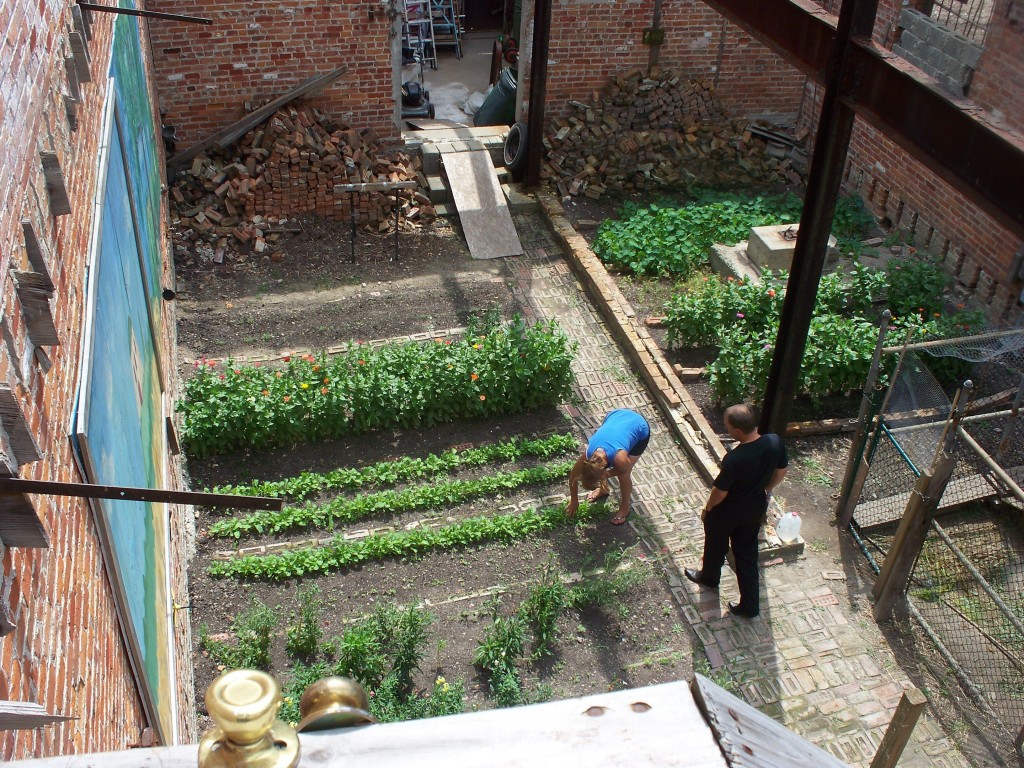
An abandoned Detroit lot produces food instead of tax revenue. Photo: Andy McGlashen
By Megan Durisin
LANSING, Mich. – To get fresh fruits and vegetables, some urban residents may start making fewer trips to the grocery store and more trips to the lot next door under the state land bank’s new Garden for Growth Program.
“The goal is to provide Michigan residents with greater access to fresh, healthy vegetables,” said Carrie Lewand-Monroe, executive director at the State Land Bank in Detroit.
The program offers $25 one-year leases and $75 three-year leases for setting up urban gardens on vacant lots.
Lewand-Monroe said there are about 9,000 empty lots scattered around the state, the majority in Detroit. The state owns them due to property tax foreclosures.
“They’re not generating any revenue and they’re off the tax rolls, so they’re not generating taxes,” Lewand-Monroe said.
Most of the plots are small and aren’t buildable, making them well-suited for parks or gardens, she said. For example, Detroit residents used to be able to build homes on lots 30 feet wide, but zoning regulations now require lots to be at least 50 feet wide, leaving a lot of foreclosed property without development value.
“There’s certainly been a push for urban residents to have access to healthy, local foods,” Lewand-Monroe said.
Many individuals and organizations like the Greening of Detroit are already renting plots.
“Some are true community gardens,” Lewand-Monroe said. “Some are used for schools, so children are coming out and gardening together. Others are just individuals with side yard gardens.”
Studies have shown that urban gardens may increase the property values of homes in a neighborhood, she said. They add “incredible value” to an area.
“There’s been native plants, flowers, vegetables,” she said, “everything from education to health to beauty.”
There are no restrictions on what people grow in their urban gardens, as long is it’s not illegal, Lewand-Monroe said.
Ingham County also has urban gardening programs.
Eric Schertzing, chair of the Ingham County Land Bank Authority Board, said one program encourages community gardens on vacant lots.
“Because of the tax foreclosure process, the land bank has land,” Schertzing said.
Many of the Ingham County plots are available at no cost, Schertzing said.
The gardens are mostly used to plant vegetables.
“It all depends on what the neighborhood wants,” he said.
Schertzing used his own plot in Lansing’s Old Town to grow raspberries, lettuce, spinach and onions.
Schertzing said he doesn’t know if urban gardening in Lansing has expanded in recent years, but it’s become more organized with groups providing training and publicizing the cause.
He said that an urban agriculture district on Lansing’s east side has the potential to become a microenterprise, in addition to feeding individuals.
“In an urban setting, fresh food can be hard to come by,” Schertzing said, “and in a grocery store, it’s often more expensive.”
The land bank is also working with other community programs including the Garden Project run through the Greater Lansing Food Bank.
Anne Rauscher, director of the Garden Project, said the program has operated since 1983, but the number of its urban gardens has expanded in recent years.
“Some of that might be from a national movement, an overall awareness of folks wanting to know where their food comes from,” Rauscher said. “It’s also the economic climate and people trying to stretch their grocery budgets a little further.”
Rauscher said the project supervises a network of 75 community gardens throughout the city and surrounding areas, including some at schools, community centers and apartment complexes.
About 80 percent of the gardeners have low to moderate incomes, Rauscher said.
“The model for our program is ‘teach a person to fish and you’ll feed him for a lifetime,’” she said. “The bulk of our gardeners are on a pretty tight budget.”
Rauscher said several international gardeners in the project grow unusual greens, but many favorites sprout up as well.
“There’s a lot of tomatoes, peppers, cucumbers,” Raushcher said. “We’re working on educating people on how to extend their seasons by planting things like beans that can take the cold.”
The food bank provides training and sponsors a Grow-A-Row project in which gardeners donate their surplus produce.
Pingback: Agriculture in Detroit; the new cash crop | Detroit